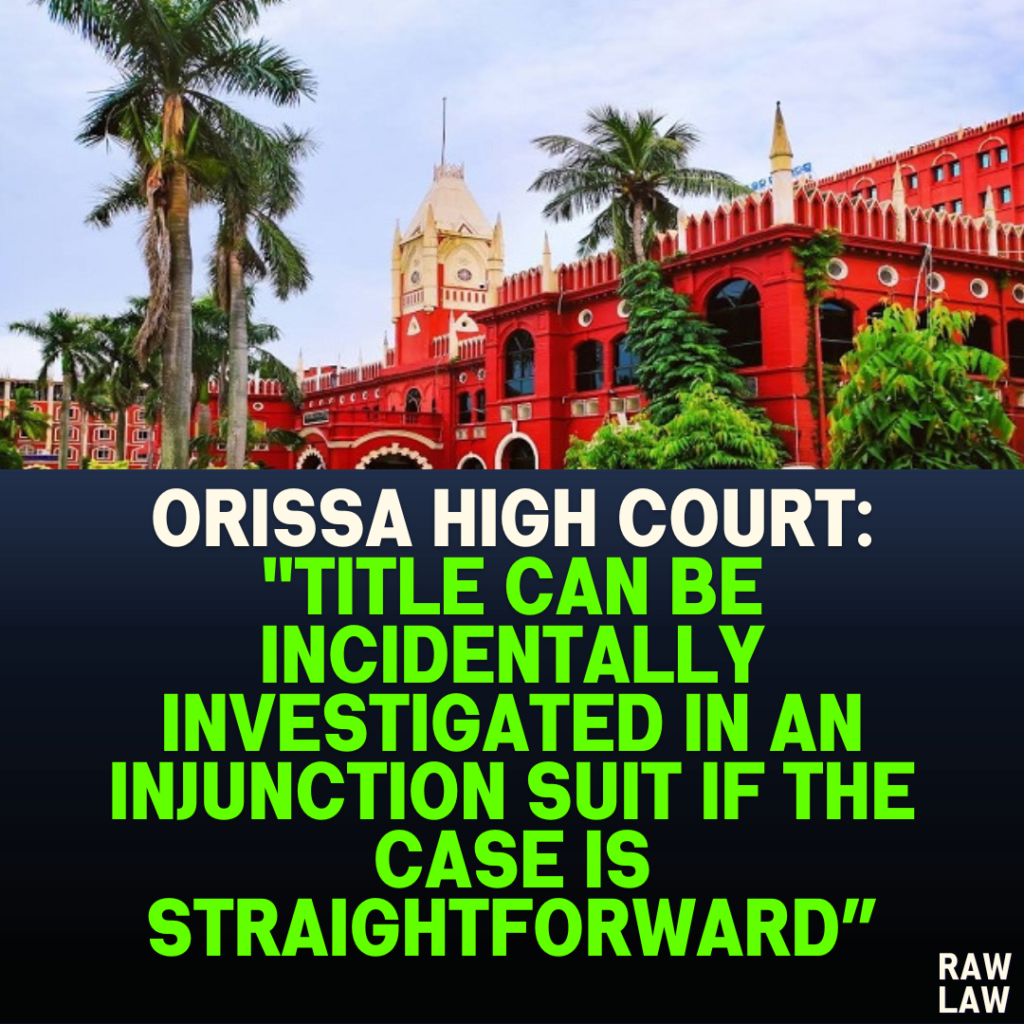Court’s Decision:
The Orissa High Court partially allowed the second appeal by modifying the lower courts’ decisions. The court confirmed the injunction over the Schedule A property in favor of the plaintiff but reversed the decision regarding the Schedule B land, which is government-owned. The defendant is permanently restrained from interfering with the plaintiff’s possession of the Schedule A land, but the court refused to grant an injunction concerning the Schedule B land.
Facts:
The plaintiff filed a suit for a permanent injunction, claiming possession of two parcels of land—Schedule A and Schedule B. The plaintiff alleged that they had purchased Schedule A land through a sale deed from Kela and Giria in 1967, which was later rectified in 1974. The plaintiff contended that the defendant, who owned adjacent land, was attempting to encroach upon Schedule A and use Schedule B to disrupt the plaintiff’s access to their home. The defendant, on the other hand, claimed that they had purchased part of the same Schedule A land and had already constructed buildings over it, while Schedule B was used for agricultural purposes. The lower courts ruled in favor of the plaintiff, granting an injunction over both properties.
Issues:
Whether the suit is barred under Section 34 of the Specific Relief Act.
Whether there was confusion regarding the identification of the disputed Schedule A and B lands.
Whether the plaintiff has the right of easement over the Schedule B government land.
Petitioner’s Arguments:
The plaintiff argued that they had clear title and possession over the Schedule A land and had been using the adjacent Schedule B land as a pathway. They further contended that the defendant was attempting to encroach upon the Schedule A property and disrupt access to their home by constructing on the Schedule B land.
Respondent’s Arguments:
The defendant claimed that the plaintiff’s acquisition of Schedule A land was fraudulent and that they themselves had validly purchased part of the same land in 1971. The defendant also argued that they had been in possession of Schedule B land, using it for agricultural purposes, and contended that the plaintiff had no legal right to claim easement over it.
Analysis of the Law:
The court examined the application of Section 34 of the Specific Relief Act and the principles regarding injunction suits. The court found that in a suit for a permanent injunction, title can be incidentally investigated. The plaintiff successfully proved their title and possession over Schedule A, while the defendant’s claim was unsupported by sufficient evidence. Regarding Schedule B, the court held that the plaintiff could not claim an easement of way over government land without admitting the defendant as the owner or impleading the government in the suit.
Precedent Analysis:
The court referred to several rulings, including Meera Awasthi v. Ajeet Awasthi, where it was held that title can be incidentally investigated in an injunction suit if the case is straightforward. It also cited T.V. Ramakrishna Reddy v. M. Mallappa, which clarified that courts may investigate title in injunction suits if necessary. Regarding the easement claim, the court referred to Dibakar Das v. Sriram Das, which established that an easement claim cannot be entertained without recognizing the defendant as the owner of the property.
Court’s Reasoning:
The court ruled that the plaintiff had established clear title and possession over Schedule A land, and the lower courts were correct in granting the injunction for that property. However, since the Schedule B land was government-owned and the plaintiff had not sought a declaration of their easement rights nor impleaded the government, the court could not grant an injunction over that land. The lower courts had erred in this aspect.
Conclusion:
The second appeal was allowed in part. The court upheld the injunction concerning Schedule A land but set aside the injunction for Schedule B. The defendant is restrained from interfering with the plaintiff’s possession of Schedule A, but the plaintiff’s claim over Schedule B was rejected.
Implications:
This judgment reinforces the legal principle that government land cannot be subject to an easement claim without a proper legal declaration. It also reiterates that in cases involving simple title disputes, courts can investigate the title in an injunction suit



